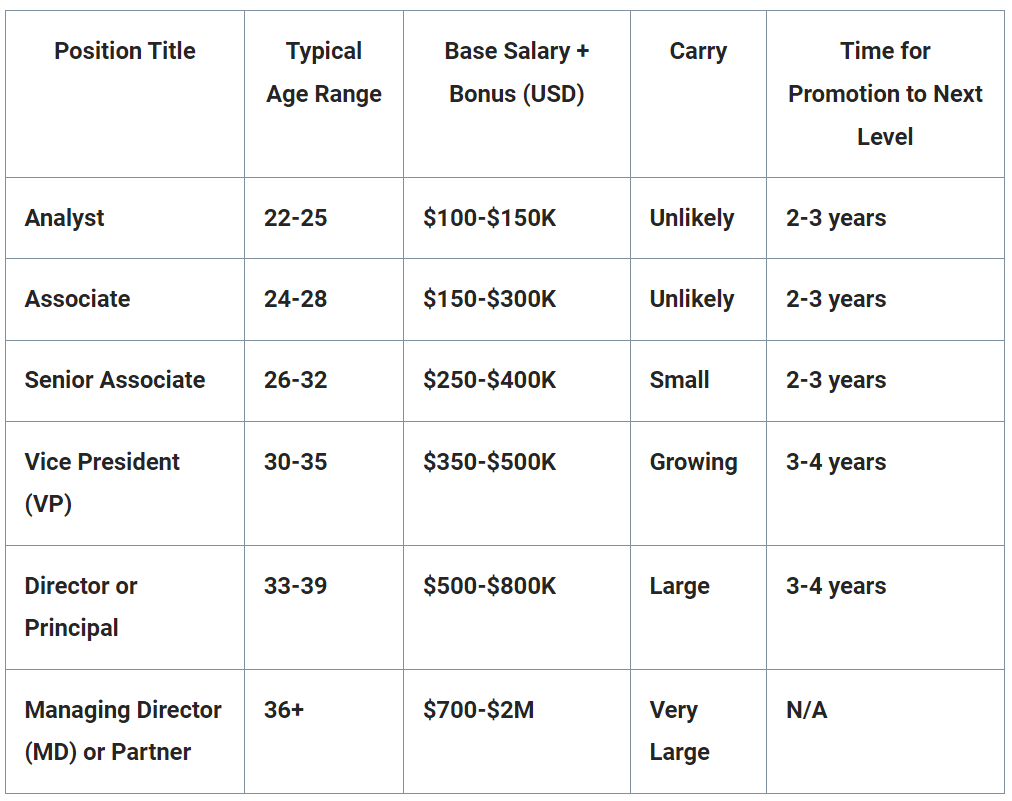Are you searching for where to get the ultimate guide on all you need to know about the private equity career path? I have you covered.
I will share all the information you need to build a successful career in a private equity firm. Building a career in private equity is quite rewarding, one of the most lucrative in the finance sector.
This above fact is due to a couple of reasons:
- You can earn a lot of money from it, it requires a lot of intelligence, and the working schedule is quite flexible.
- With this career, your time is not choked up, and you can attend to other personal matters, unlike other overly demanding finance sectors, like investment banking, that take up most of your time.
- In your career in a private equity firm, you will be moving from one level to another, and getting deals done is a good way of making a mark in your career.
But apart from that, also note that you must put in the work, as you will be required to gather enough data and work with portfolio companies.
What does a private equity career entail?
Private equity is fast becoming one of the investment types companies are considering.
Private equity refers to the capital investments a firm makes in private companies. These private companies are not registered on any public exchange platform, so it’s a good option for investment.
So to drive home the point, equity is the amount allotted to shareholders of a company after all existing debt has been cleared. Going further from providing the funds these companies need, private equity firms look for portfolio companies where they can invest.
They invest and buy shares, hoping that the investment would appreciate over some time, and most of the time, there is a set time allocated for the growth to happen.
Private equity investment can benefit the company and the private equity firm investing in them. They can also offer mentorship and coaching to the host company.
This is because they would receive training from private equity professionals in the business, seeing that they need lots of improvement and transformation in their company.
Why should you choose a private equity career?
Over the years, the private equity sector has grown in popularity and is now one of the major hubs for investment bankers who want to switch careers. Here are some reasons why you should choose a private equity career:
- The job comes with many juicy bonus packages and other side giveaways, including a more flexible schedule than investment banks, which has an 80 hours a week schedule.
- Recently, more and more people have been entering PE firms, making it a place where people of different levels of expertise are hired as employers keep taking in more applicants.
- A private equity career is a great place to work with opportunities to collaborate with other companies in creating a good working relationship.
4 Skills you must possess in the private equity career path
There are some skills that anyone wanting to enter a private equity firm must possess if such a person wants to succeed in the industry. These skills are:
1. Dedication
Energetic and passionate individuals who can go on the job for long hours, private equity requires a lot of time, so you must be willing to dedicate your time to get things done.
2. Attention to detail
You must pay attention to every little detail. Remember that you will be handling lots of important information, so being detail-oriented is essential to avoid making mistakes.
3. Savvy mind
Adventurous and ready to think out of the box, you must be prepared to take on new challenges, explore new deals, and sign new contracts.
4. Goal-oriented
You should be interested in the company’s growth and align yourself with the long-term goals and other deals that would build a legacy for the company in years to come.
Educational requirements and basic training
Educational requirements
- In the private equity sector, applicants should have at least a bachelor’s degree that requires analytical thinking, like accounting, finance, mathematics, etc.
Basic training
- You need analytical thinking skills if you go into private equity because you will be handling private equity funds, which requires some technical management skills.
- Your experience and skills from these other fields can be transferred to this new field, so it’s a win-win situation.
6 Benefits of private equity careers
Is the private equity career worth it? Is it even profitable? Here are a few reasons this career is good for you. Its benefits must be considered. Take a look at them:
1. Huge salary
Private equity jobs come with huge salaries. They are one of the high-paying jobs as far as the finance industry is concerned. Also included in the jobs are bonus packages at any level.
2. Gain experience
You have the privilege of interacting with other firms, industries, and the higher administrative team to gain relevant experience as a junior-level staffer.
3. Career growth
There is more than enough room for you to show off your skills and expertise because the firm is relatively small. Your performance is evident, and nobody will cover you up. You have all the space in the world to prove yourself.
4. Steady functioning
The company does not experience fluctuation to changes in technology because its operations come from the top-level executives.
5. Increased pay
As you move higher to a new level, your pay also increases. Talk of what the senior-level people in private equity firms earn is high compared to other financial careers.
6. Flexible working hours
While it is true that you need to work for longer hours in the private equity industry still, working hours are more flexible. It’s much better than you have with investment bankers, especially at the mid-entry levels. Schedules are flexible.
Private equity career path ranking order
The private equity career path takes a smooth slope from the entry-level to the top management and partnership levels.
There are different ladders to climb in your career at a private equity firm, and each stage comes with its requirements and responsibilities.
Note that the requirements might vary depending on the company. Let’s look at these career hierarchies and their requirements:
1. Analyst
An analyst is one of the entry-level positions in the private equity industry where workers still need to handle significant deals.
They are still relatively new and under supervision. Most private equity analysts already have some years of experience.
They are switching jobs from accounting, investment banks, or other consulting firms.
Specific duties
- Evaluating and assessing the current performance of the financial statements
- Making a forecast of the future performance of the economy from the current value
- Access and analyze new investment opportunities to know if the company should invest or not
- Creating all the reports of how the account performed
2. Associates
Associates are on a higher hierarchy in private equity firms. They can now be entrusted with more complex tasks.
The private equity associates oversee and monitor the junior-level staff to ensure they are on track and correct any mistakes made.
Also, their job is to liaise with other administrative heads to examine a particular investment opportunity and decide whether to venture into it.
Specific duties
- Look out for new investment opportunities by reaching out to third-party agencies
- Work closely with the management teams and negotiate with investors
- Use the capital structure to estimate the returns of a potential investment
- Write the internal report documents
- Assist the management in the investment planning and execution period
3. Senior Associate
The role of a senior associate involves broader responsibilities in the company.
They oversee all the investment stages from the start, processing stage, monitoring, execution, and giving feedback.
They do due diligence from the beginning of a project till the end, making them fully invested.
Specific duties
- Making research on the new investment opportunities
- Help in all the investment projects of the company
- Work with business partners in many cases
4. Vice President
The vice president’s (VP) duties are to oversee how the investments are managed. They are the ones that partners would talk to most of the time.
Most of the time, the VPs travel a lot, meet with partners and strike a working relationship with them on behalf of the company. Their jobs also require traveling to meet new clients and secure deals.
Specific duties
- Supervise the daily operations of the other team members of an investment project
- Collaborate with senior management teams
- Monitors how the investments are being managed
- Handle the company’s due diligence
- Play an active role in investment negotiations
5. Principal/Director
The principal or director is among the highest positions in private equity firms. They use their influence to convince the partners and put a more permanent seal on the deal.
Once the deal is gotten and all necessary consultancy is done, and the investment is approved, if there is a need for further negotiations with the partners, that’s when the principal comes in.
Specific duties
- Leads the investment team
- Involves in further negotiations and restructuring of deals
- Working with partners and team members alike to ensure adherence to investment requirements and deadlines
- Leads the valuation process
- Oversees monthly meetings and annual reports
- Mentors and coaches other junior-level staff on the company investments
6. Managing Directors
This position is considered the most senior in the firm and takes the final decisions.
Most times, they are the founders of the company. They are in control of all the operations going on in the company and delegate some other management duties to the directors.
They are in charge of interacting with the management team of each portfolio company and governing all the investment committee members.
Specific duties
- Lead the sourcing of portfolio investments
- Lead the meetings and the process of the portfolio investments
- Oversee the private equity fund advisory committee
- Guide other members of the investment committee on the project
- Build strong and reliable work team members
- Responsible for the overall functioning of the company
The salary range for the different private equity careers in the US

3 Drawbacks of private equity career
Private equity also has its downsides and limitations as a private firm. What are these drawbacks:
1. Demanding
If you are working for a private equity firm, you will still need to deal with the job’s demands, working long hours and sometimes coupled with traveling when you advance in your career.
2. Slow promotion
Private Equity does not have a clear-cut career path, so you usually work for a long time without any promotions to a new level. And even in a company with that, your senior colleagues hardly ever retire for new ones to take over.
3. Limited network
Private equity firms are smaller compared to what you have in banks, so this also means that you have a smaller network of people to work with and the training you would receive cannot be as structured as a local bank.
Final thoughts
As stated in this article, a career in private equity can be rewarding, and you can make an incredibly successful career out of it. If you carefully look at how private equity is designed, you can see that its operations are simple and direct.
It’s a career where you put in the work if you want to grow, so your success depends on the amount of time spent working. Looking at both the personal and work gratification it gives you, it can be said to be a worthy career choice to add to the job’s perks.
It comes with bonus packages to encourage performance. However, if you work well, you will receive even more bonuses. So if a career in private equity is your thing, what are you waiting for? Go for it.

















